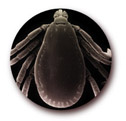Travel with your Pet to Vancouver!
Pet Friendly Vancouver!![]()
And Then There are Ticks
 Ticks are wingless creatures that live exclusively on the blood of animals for three of the four stages of their life cycle. They are equipped with an apparatus called Haller's organ which senses heat, carbon dioxide and other stimuli to allow the ticks to locate the presence of an animal food source. Once found, they crawl on and embed their mouth parts into the animal's skin and proceed to suck up its blood.
Ticks are wingless creatures that live exclusively on the blood of animals for three of the four stages of their life cycle. They are equipped with an apparatus called Haller's organ which senses heat, carbon dioxide and other stimuli to allow the ticks to locate the presence of an animal food source. Once found, they crawl on and embed their mouth parts into the animal's skin and proceed to suck up its blood.
You should inspect your pet regularly for ticks, especially if they have been outside in areas where there are woods or tall grasses. A thorough combing within 4 to 6 hours of exposure to such environments can help prevent ticks from attaching themselves to feast on your pet. Should you find a tick, it should be removed immediately, as the longer it is attached to its host, the greater the chance for disease. Do not touch the tick. Wear gloves and use tweezers to carefully grasp the exposed section of the tick's body near your pet's skin. Gently pull until the tick lets go. To dispose of the tick, wrap it in several tissues and flush it down the toilet. Do not crush, burn or suffocate it, as any one of those actions may spread infectious bacteria.
And Then There is West Nile Virus and Heartworm from Mosquitos
 Heartworms are parasites that live in the blood of an infected dogs’ heart and surrounding blood vessels. They are transmitted to the dog (host) by the bite of an infected mosquito. The adult worms live in the heart of the host. These nasty little creatures can cause serious problems for dogs by enlarging the heart, restricting blood flow and damaging internal organs. It can usually be treated with drugs, but the best way to treat heartworm is with prevention. Talk to your veterinarian about treatments prior to traveling to a mosquito infested area.
Heartworms are parasites that live in the blood of an infected dogs’ heart and surrounding blood vessels. They are transmitted to the dog (host) by the bite of an infected mosquito. The adult worms live in the heart of the host. These nasty little creatures can cause serious problems for dogs by enlarging the heart, restricting blood flow and damaging internal organs. It can usually be treated with drugs, but the best way to treat heartworm is with prevention. Talk to your veterinarian about treatments prior to traveling to a mosquito infested area.
West Nile Virus is also spread from host to host by infected mosquitoes. Using a mosquito repellant specifically designed for dogs, not being outside at active mosquito times like dawn and dusk and taking any veterinarian prescribed preventions will help protect your dog from mosquito transmitted diseases.
Robin


